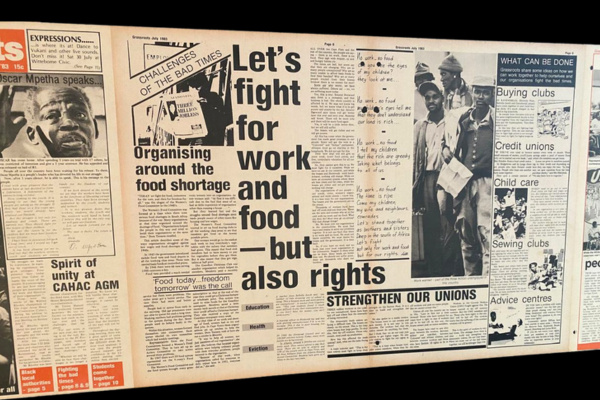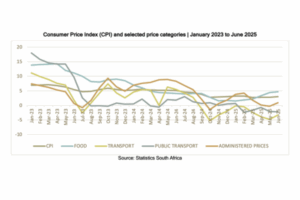Dear Comrades,
On this Workers’ Day, the Labour Research Service salutes worker representatives, the everyday heroes of the labour movement who are advancing a more just and inclusive world of work.
In 2024, we witnessed the power of worker organising and bargaining in action:
Volunteer food handlers in Gauteng mobilised for dignity and recognition in the National School Nutrition Programme. Their message, “I am not Tintswalo,” cut through political noise and exposed the invisibility of women’s care labour. Food handlers strengthened their advocacy, movement and alliance-building and achieved tangible wins.
Shop stewards and union officials honed their bargaining skills through our learning programme and are now better prepared to formulate strong demands and achieve improved outcomes. Across sectors, unions secured wage increases above inflation, with the National Minimum Wage rising from R25.42 to R28.79.

Note: The sample of 561 wage agreements covers 2,034,816 workers.
Migrant workers in precarious jobs found support through our collective bargaining support. A MIWUSA official successfully represented a worker in a CCMA dismissal case, winning full reinstatement and pay. With the right support, worker organisations can be powerful defenders of justice for all workers.
In corporate governance, we engaged companies directly through ACTIVE Shareholder, a non-profit organisation helping socially responsible investors exercise their rights by voting at general meetings. In 2024, we voted at eight company AGMs, opposing several remuneration policies and executive reappointments. The development of an ESG Index focusing more on social aspects is ongoing.
In international trade, trade unions in Namibia and Kenya claimed seats at the African Continental Free Trade Agreement (AfCFTA) national implementation committees through their advocacy supported by LRS and ITUC-Africa. These breakthroughs mean workers’ in the countries will now be part of shaping the development of the biggest free trade area in the world by population. It also means other unions demanding social dialogue through our continental campaign on the AfCFTA have inspiring examples. At the same time, the US-China trade tensions show how global trade wars can have far-reaching consequences for jobs, wages, and industrial stability. We must demand trade policies that prioritise decent work, local production, social protection and social justice.
Teacher unions across Africa reignited the campaign to end school-related gender-based violence through a coordinated continental campaign. They co-created strategies that prioritise safety, inclusion, and dignity in our education systems. Teachers also demand the ratification and implementation of ILO Convention 190 on violence and harassment in the world of work. Public sector unions can access Practical Guide for Implementing ILO Convention 190 in Public Sector Workplaces. The guide, developed through LRS collaboration with Public Services International, offers collective bargaining and Occupational Health and Safety as natural entry points for implementing C190.
The United National Transport Union (UNTU) embraced inclusion and embedded strategies to address gender-based violence and harassment (GBVH) into their mainstream work. For the first time, the union used an OHS risk assessment to identify workplace hazards and develop targeted interventions.
LGBTQ+ unionists amplified voice and solidarity at the ILGA World Conference, where LRS facilitated the first Southern Africa trade union pre-conference workshop on LGBTQ+ inclusion. The workshop participants reflected on how culture, identity and workplace violence intersect, and used tools such as the Global Unions’ Toolkit for to support LGBTQ+ workers under ILO Convention 190.
Our work in technology for trade unions use saw the growth of digital organising spaces like the WhatsApp group for Volunteer Food Handlers, facilitated through a feminist pedagogy that prioritises co-creation and inclusion. Our expertise in tech facilitation shows that technology can amplify worker power when guided by care, curiosity and purpose.
And in Just Transition, we developed knowledge through our partnerships with FES and others, pushing the climate and economic justice agendas to include care work, social protection, and the needs of women and vulnerable workers.
One truth runs through all our stories: workers know best what justice looks like, and their voices must lead change.
We are proud to walk beside you, co-creating resources, learning spaces, research, and campaigns that advance inclusion, equity, and dignity in the workplace.
We see you. We honour you. We stand with you in 2025 and beyond.
In solidarity,
The LRS Team







